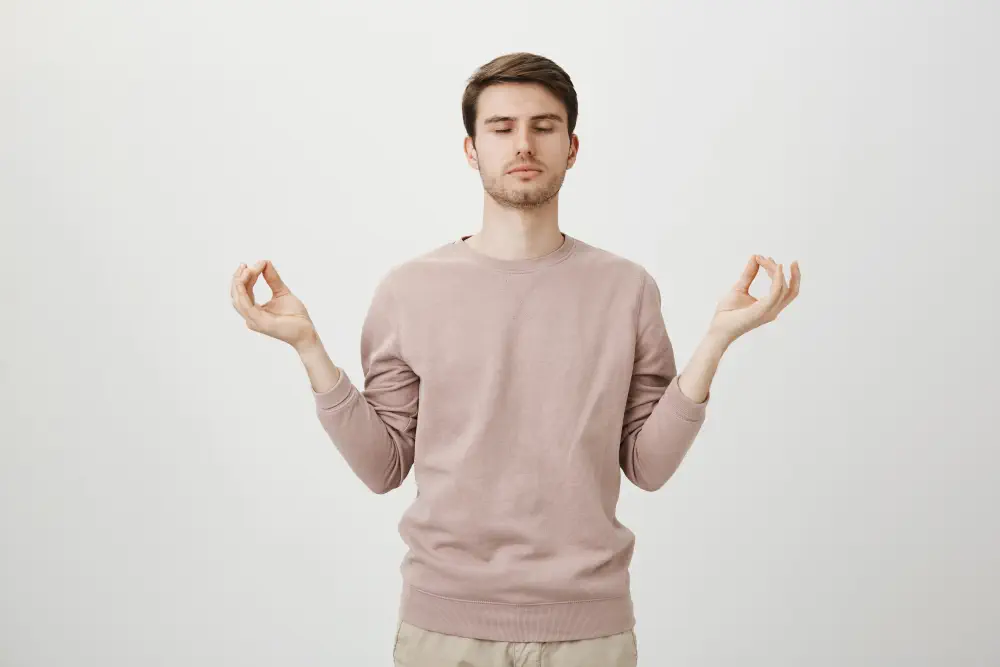We offer medical detox and multiple addiction treatment options in our
luxury treatment centres in Port Hope, Cobourg, and Ottawa.
Unmasking the Risk of Ambien Addiction
Night after restless night. Staring at the ceiling. Checking the clock. Again. 3:47 AM.
For millions struggling with sleeplessness, Ambien feels like salvation in pill form. Just one tablet, and finally, sleep comes.
But there's a darker side to this popular prescription that many don't see coming until they're caught in its grip. Despite being prescribed by doctors and taken by patients with legitimate sleep problems, Ambien carries a hidden risk that deserves more attention than it typically receives.
Key Takeaways
- Ambien is a short-term prescription sleep aid that enhances brain chemicals to help you sleep.
- Dependence and addiction can develop even when taken as directed, especially with longer use or higher doses.
- Serious side effects include sleepwalking, memory loss, and mental health issues, worsened by alcohol use.
- Warning signs of addiction include needing higher doses, secretive use, and withdrawal symptoms.
- Stopping Ambien safely needs medical help; therapy and better sleep habits are effective alternatives.
Let's pull back the curtain on how this seemingly innocent sleep aid can lead some down a path to dependency they never anticipated.
How Ambien Medication Works?
The little white Ambien pill doesn't look particularly special. Yet it packs a powerful punch against insomnia by targeting your brain's off-switch.Ambien belongs to the "Z-drug" family—sedative medications chemically distinct from older sleep aids like Valium. Pharmaceutical companies developed the Ambien drug to knock you out without the same baggage that comes with traditional benzodiazepines.

How does it work? Think of your brain as having both accelerator and brake pedals. GABA is your brain's natural brake fluid. The drug essentially supercharges this system by binding to specific GABA receptors, flooding your neural circuits with "slow down" signals. Your racing thoughts quiet. Your heightened alertness fades. Sleep follows.
Doctors prescribe this Ambien medication with strict limitations—intended for brief episodes of insomnia lasting only two to four weeks. The standard Ambien pill comes in regular-release (5mg or 10mg) that works quickly, or extended-release forms (6.25mg or 12.5mg) designed to help you stay asleep longer. Women typically need lower doses than men because they metabolize the drug differently.
The Slippery Slope: From Dependence to Ambien Addiction
The human brain demonstrates remarkable adaptability—a characteristic that contributes to both our survival and, unfortunately, our vulnerability to substance dependence. With regular Ambien use, the brain adjusts to the drug's presence, leading to tolerance, where the same dose produces diminishing effects.
Physical dependence describes the state where the body has adapted to the Ambien drug and requires it to function normally. Without it, withdrawal symptoms emerge. This dependence can develop even when taking the medication exactly as prescribed.
Ambien addiction, however, goes beyond physical dependence. It involves compulsive drug-seeking behaviour despite negative consequences. This condition alters thinking patterns and behaviours, creating psychological cravings alongside physical needs.
Several factors influence the risk of developing problematic Ambien use:
- Duration of use (risk increases significantly beyond two weeks)
- Higher dosages
- Personal or family history of substance abuse
- Pre-existing mental health conditions
- Genetic factors affecting drug metabolism
A critical point often overlooked: patients can develop dependence even while following prescription guidelines precisely. The transition from help to habit can occur subtly, without obvious warning signs.

Beyond Sleepiness: Unforeseen Ambien Side Effects and Dangers
While drowsiness represents the intended effect of Ambien, numerous other side effects may accompany its use:
Common side effects:
- Daytime drowsiness
- Dizziness
- Headache
- Gastrointestinal disturbances
- Altered taste perception
More concerning are the serious adverse effects that can emerge:
Complex sleep behaviours occur when individuals perform activities while not fully conscious. These episodes can include sleep-walking, sleep-eating, and most dangerously, sleep-driving. Patients typically have no recollection of these events the following day.

Memory impairment manifests as anterograde amnesia, where users cannot form new memories during the period the drug remains active. This effect explains why some individuals report "lost time" after taking the medication.
Mental health impacts may include worsening depression, increased anxiety, or rarely, suicidal thoughts.
The combination of Ambien and alcohol creates a particularly hazardous situation. Both substances depress central nervous system function, and when taken together, they produce a synergistic effect that dramatically increases the risk of:
- Excessive sedation
- Respiratory depression
- Loss of consciousness
- Potentially fatal overdose
This dangerous interaction explains why healthcare providers emphasize absolute avoidance of alcohol while using Ambien.
Signs of Developing Ambien Addiction
Identifying problematic drug use early can prevent progression to full-fledged addiction. Watch for these warning signals:
- Tolerance development – Needing increasingly higher doses of the Ambien drug to achieve sleep
- Dose escalation – Taking more of the medication than prescribed
- Purpose shifting – Using Ambien for its calming effects rather than solely for sleep
- Failed reduction attempts – Unsuccessful efforts to cut down or control use
- Time consumption – Spending considerable time obtaining additional prescriptions
- Life disruption – Neglecting responsibilities at work, school, or home
- Withdrawal symptoms – Experiencing physical or psychological distress when not using
- Doctor shopping – Visiting multiple healthcare providers to secure prescriptions
- Secretive behaviour – Hiding or being defensive about Ambien use
- Financial strain – Spending increasing amounts of money to obtain the drug
The presence of multiple indicators suggests Ambien addiction may be developing or already established. Recognition represents the crucial first step toward addressing the problem.
How to Deal with Ambien Withdrawal
Discontinuing Ambien after developing dependence triggers a withdrawal syndrome as the body readjusts to functioning without the drug. The intensity of Ambien withdrawal varies based on factors including duration of use, typical dosage, and individual physiology.
Common withdrawal symptoms include:
- Rebound insomnia – Sleep difficulties that return with greater intensity
- Anxiety and agitation
- Tremors
- Sweating
- Nausea and vomiting
- Muscle cramps
- Elevated heart rate and blood pressure
- Seizures (in severe cases)
The withdrawal timeline typically follows a particular pattern. Initial symptoms emerge about 24-48 hours after the drug leaves the system. Then, for a time of 3-5 days, there is a peak intensity of physical symptoms. You can expect a gradual reduction in physical symptoms after one or two weeks. And the potential persistence of sleep disturbances and psychological symptoms may last from weeks to months.
Due to the possibility of severe reactions, including seizures, medical supervision during Ambien withdrawal is strongly recommended. Healthcare providers typically implement a tapering schedule, gradually reducing the dose to minimize withdrawal symptoms and risks.

Treatment and Recovery from Ambien Addiction
Overcoming Ambien addiction typically requires a structured approach combining medical and psychological interventions:
Medically supervised detoxification provides safe management of withdrawal symptoms through:
- Gradual dose reduction (tapering)
- Temporary medication to manage specific symptoms
- Monitoring for complications
- Medical support throughout the process
Therapeutic interventions address psychological aspects of addiction:
- Cognitive-behavioural therapy helps identify and change patterns driving insomnia and medication misuse
- Individual counselling explores underlying issues contributing to sleep problems
- Group therapy offers peer support and shared experiences
- Family therapy repairs damaged relationships and builds support systems
Addressing root causes focuses on resolving factors that initially led to insomnia:
- Treatment for co-occurring mental health conditions
- Sleep hygiene education
- Stress management techniques
- Pain management for those with chronic pain
Recovery from Ambien addiction represents a journey rather than a destination. Many individuals experience significant improvements with appropriate treatment, gradually regaining natural sleep patterns and developing healthier coping mechanisms.

Using Ambien Safely and Exploring Alternatives
For those prescribed Ambien, several strategies can minimize addiction risk:
- Strict adherence to prescribed dosage and duration – Never increase dose without medical consultation
- Regular communication with healthcare providers – Report concerns about effectiveness or side effects promptly
- Complete avoidance of Ambien and alcohol combinations – This pairing significantly increases danger
- Proper timing of medication – Take only when able to dedicate 7-8 hours to sleep
- Secure storage – Keep medication away from others, particularly teenagers or those with substance use history
- Immediate disposal of unused medication – Remove temptation for future unmonitored use
Many effective approaches to insomnia exist beyond medication:
- Cognitive-behavioural therapy for insomnia (CBT-I) has demonstrated excellent long-term outcomes
- Sleep hygiene optimization includes consistent sleep schedules, appropriate bedroom environment, and pre-sleep routines
- Relaxation techniques such as progressive muscle relaxation, deep breathing, and meditation
- Stimulus control therapy re-associates the bedroom with sleep rather than wakefulness
- Sleep restriction therapy temporarily limits time in bed to consolidate sleep periods
FAQ
My doctor prescribed Ambien. Can I get addicted even if I follow the instructions?
Sorry to be the bearer of bad news, but yes. Your body doesn't care whether you have a prescription. Take Ambien nightly for 2-4 weeks, and physical dependence often follows—even at the exact dose your doctor recommended. While dependence isn't full addiction, it's standing at addiction's doorstep, knocking loudly.
How fast could I become dependent on Ambien?
Faster than most people realize. Two weeks of nightly use can do it. Your brain adapts to zolpidem with surprising speed. That's why doctors hate refilling these prescriptions and why those two-week limits exist on the prescription guidelines.
I sometimes have a glass of wine with my Ambien. What's the big deal?
Please stop doing that immediately. Mixing Ambien and alcohol creates a potentially deadly combination. Both substances tell your brain and body to slow down, but together, they're like hitting the brakes too hard. Your breathing can slow dangerously or stop completely. People black out, make bizarre decisions, or simply don't wake up. The risk jumps exponentially compared to taking either substance alone.
Are the withdrawal symptoms really that bad?
They can be brutal and sometimes dangerous. Beyond the obvious rebound insomnia (which feels like your original sleep problems on steroids), severe cases can trigger seizures and psychological turmoil that's genuinely frightening. This isn't something to white-knuckle through alone in your bedroom. Medical supervision during detox isn't just a suggestion—it might save your life.
Is there hope after Ambien addiction?
There's always hope. With proper withdrawal management under medical care and therapy that gets to the root of your sleep struggles, people bounce back from Ambien addiction every day. Your natural sleep patterns can return, though it takes time and patience.
What's my best bet for handling chronic insomnia without Ambien?
Cognitive-behavioural therapy for insomnia (CBT-I) outperforms medications in the long run. Unlike pills, it teaches your brain and body sustainable sleep skills without the addiction baggage. Finding a therapist trained in CBT-I might be the best move you'll make for your sleep health. Sleep hygiene improvements and addressing underlying medical issues (like sleep apnea or restless leg syndrome) often solve what pills only temporarily mask.






